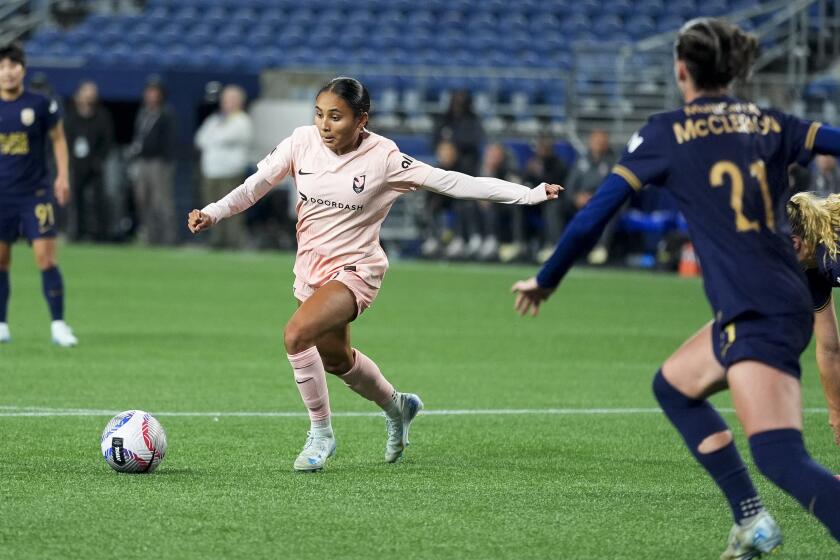Darkness could give way to a bright near-future for Germany
- Share via
On a gray and cold November day in the Ruhr Valley, it was left to Michael Ballack, longtime captain of Germany’s national team, to perform the most symbolic act.
Before Germany’s game against Ivory Coast, Ballack gently placed the No. 1 jersey of goalkeeper Robert Enke on the German bench.
Enke should have been playing that afternoon, just as he should have been playing at the World Cup that starts in South Africa next month.
But the 32-year-old goalkeeper, deeply depressed by the 2006 death of his young daughter, had committed suicide by leaping in front of a train in his hometown of Hannover eight days earlier.
The weight of Enke’s death still hangs heavy over Germany’s national team, but if there is strength to be found in adversity or inspiration to be found in tragedy, then Germany will have it in South Africa.
Rene Adler was to have taken Enke’s place as Germany’s starting goalkeeper, but Adler fractured ribs last month and will miss the World Cup.
Just who will be in the nets for Germany is unclear, but it could be 35-year-old Hans-Joerg Butt, one of seven players from Bayern Munich named on Coach Joachim Low’s preliminary roster.
The Bavarian club is enjoying its finest season in years. Last week it clinched the German Bundesliga title, on Saturday it was due to play Werder Bremen in the German Cup final in Berlin, and on May 22 it will play Italy’s Inter Milan in the European Champions League final in Madrid.
Small wonder that Low has brought into his World Cup squad not only Bayern goalkeeper Butt but also defenders Philipp Lahm and Holger Badstuber, midfielder Bastian Schweinsteiger and forwards Miroslav Klose, Mario Gomez and Thomas Muller.
By July 11, when the World Cup final is played in Johannesburg, the seven Bayern players could have four titles to their name.
“We are not among the favorites but we do have the potential to do something out there,” Low said of Germany’s chances. “Tactically, we’re stronger than in 2006 and 2008.”
Four years ago, Low was then-coach Jurgen Klinsmann’s right-hand man as Germany, playing at home, finished third. This time around, Klinsmann will be a television analyst, and it is Low, a youthful-looking 50, who carries the burden of expectation. “Germany will always go to the World Cup aiming to win, and they can,” Klinsmann said.
Third in ‘06, second behind Spain at Euro 2008, first at South Africa 2010? It is not beyond the realm of possibility.
Low’s preliminary squad features six players who are 21 or younger. “They may be short on experience but they have a lot of qualities,” he said.
The next generation includes Werder Bremen playmaker Mesut Ozil, 21, the most creative player on the team. It also includes Muller, a 20-year-old striker who, Low said, “has an incredible instinct to be in the right place and the right time to score, and he can play in several positions.”
Then there is Bayer Leverkusen midfielder Toni Kroos, 20, the most valuable player at the FIFA Under-17 World Cup in South Korea in 2007. Touted for greatness, Kroos made his debut for Germany in a 1-0 loss to Argentina in Munich in March.
But it is the previous generation that will have to do the heavy lifting if Germany, a three-time winner and four-time runner-up, is to advance from a first-round group that also features Australia, Serbia and Ghana.
That means Chelsea’s Ballack, who in the words of one analyst goes into the World Cup “as either a 33-year-old veteran whose best days are behind him or as a seasoned campaigner on the game’s biggest stage.”
For his part, Ballack already has been playing mind games with Germany’s opponents, hoping to lull them into a false sense of security.
“As far as the world title is concerned, we lack both the consistency and the squad,” he said.
Then there is Klose, the only player to score five goals in consecutive World Cups, a feat he achieved in 2002 and 2006. His agenda is personal.
“If I managed six goals next summer,” he said last year, “I wouldn’t just be Germany’s leading World Cup goal scorer, I’d be the all-time record holder. That’s my target.”
Low has kept faith with the attacking duo of Klose (48 goals in 94 games for Germany) and Cologne’s Lukas Podolski (37 in 70), but he can turn to Muller and Gomez if they fail to come through.
Finally, there is Lahm, probably Germany’s best player and one of eight holdovers from the 2006 team that lost in overtime to eventual champion Italy in an epic semifinal.
The versatile and attack-minded Lahm can play either fullback position, but as one Berlin newspaper said in 2006, “the country would prefer to have Lahm play left back and right back at the same time.”
He, and the memory of Enke, could carry Germany far.







